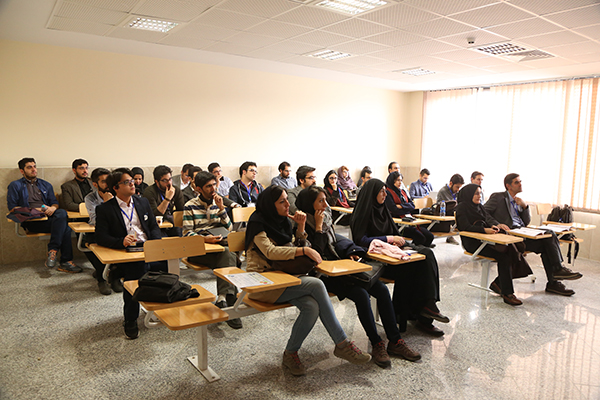
Intraocular diagnosis surgery is the current research topics of Advanced Robotics and Automated System (ARAS) research themes. Since the human eye is a very delicate organ with minuscule anatomic structures, the ocular surgeries are needed to be performed under extra precision and higher manipulation capabilities in contrast to other surgeries. In fact, any minor surgeon miss-manipulation, which might be negligible in the majority of other surgical operations, might lead to unreversible complications and even blindness for the patient in the ocular surgeries. This fact highlights the importance of assistive technologies in eye surgical procedures. This workshop introduces ARASH:ASiST (ARAS Haptic system for EYE Surgery Training) developed at ARAS Surgical Research Group as a novel system used in intraocular surgeries, and the current research horizons are described for interested researchers. Furthermore, the skill and style of expert surgeons, are identified through CNN-based Networks from Video-based Capsulorhexis surgery by using AI methods. Current research horizons for skill assessment and transfer to novice surgeons will be discussed in detail, and the developed Eye surgery datasets are introduced to the interested researchers. Finally, the use of VAE-based Deep learning methods is introduced to classify Keratoconus Eye Disease from Pentacam medical Images, and ARAS-FARABI image-based dataset is introduced to interested researchers.
|
No. |
Speaker(s) |
Title |
Du. (Min) |
|
1 |
Opening Speech |
||
|
1.1 |
Hamid D. Taghirad |
Introduction to ARAS-FARABI collaborative and translational research projects |
10 |
|
2 |
ARASH:ASiST And Intelligent Control Architectures In Vitreoretinal Surgeries |
||
|
2.1 |
Seyed-Farzad Mohammadi |
Multidisciplinary Research on Eye Dignosis and Surgery |
20 |
|
2.2 |
Mohammad Motaharifar |
ARASH:ASiST System for Vitreoretinal Surgery Training |
15 |
|
2.3 |
Reza Heidari |
Skill Transfer in Eye Surgery Training |
15 |
|
2.4 |
Q/A + Short Break |
30 |
|
|
3 |
Artifical Intelligence In Capsulorhexis Surgery And Keratoconous Diognosis |
||
|
3.1 |
Parisa Abdi |
Cataract Surgery and Capsulorhexis Complications |
15 |
|
3.2 |
Mohammad Javad Ahmadi, Mohammad Sina Allahkaram |
AI in Surgery: Surgical Skill Assessment/Transfer |
20 |
|
3.3 |
Maryam Mohammadzadeh |
Keratoconus Diagnosis and Classifications |
20 |
|
3.3 |
Hamid D. Taghirad |
AI Technology for Keratoconous Dignosis |
15 |
|
3.4 |
Q/A |
15 |
|
|
4 |
Final Technical Panel |
||
|
4.1 |
Surgeons: A. Lashay, S.F. Mohammadi, H. Riazi, P. Abdi, M. Mohammadzadeh Engineers: H.D. Taghirad, M. Motaharifar, R. Heidari, M.J. Ahmadi, M.S. Allahkaram |
The Future of Interdisciplinary Research And Development |
40 |
|
Total: 215 |
|||

Hamid D. Taghirad, Ph.D. K. N. Toosi University of Technology.
Hamid D. Taghirad received his B.Sc. degree in mechanical engineering from the Sharif University of Technology, Tehran, Iran, in 1989, his M.Sc. in mechanical engineering in 1993, and his Ph.D. in electrical engineering in 1997, both from McGill University, Montreal, Canada. He is currently a Professor and the Director of the Advanced Robotics and Automated System (ARAS), Department of Systems and Control, Faculty of Electrical Engineering, K. N. Toosi University of Technology, He is a senior member of IEEE, associate editor of Frontiers in Robotics and AI – Biomedical Robotics, and the editorial board of International Journal of Robotics: Theory and Applications. His research interest is robust and nonlinear control applied to robotics and his applied research focuses on medical robotics, parallel and cable robotics, and VR and AI in medical applications. His publications include five books and more than 250 papers in International Journals and conference proceedings.

Prof. Seyed-Farzad Mohammadi, MD. Tehran University of Medical Science.
Seyed Farzad Mohammadi received the fellowship degree in anterior segment of the eye from Tehran University of Medical Sciences, Tehran, Iran, in 2007. He is currently a Professor of Ophthalmology at Translational Ophthalmology Research Center, Farabi Eye Hospital, Tehran University of Medical Sciences, Tehran, Iran. Dr. Mohammadi is Board-certified in Ophthalmology and Fellow of International Council of Ophthalmology. In recent years, he has been focused on visual optics, refractive surgery, academic ophthalmology and leadership, ophthalmic nursing and qualitative research, and vision-related quality of life.

Prof. Alireza Lashay, MD. Tehran University of Medical Science.
Alireza Lashay received the fellowship degree in vitreoretinal surgery from Tehran University of Medical Sciences, Tehran, Iran, in 1993. He is currently an Emeritus Professor at Farabi Eye Hospital, Tehran University of Medical Sciences, Tehran, Iran. His research interests includes Vitreoretinal Surgery, Macular Degeneration Electroretinography and Cataract Surgery.

Dr. Parisa Abdi, MD. Tehran University of Medical Science.
Dr. Parisa Abdi currently works at Farabi hospital as a assistant Professor of Cornea and External Eye Diseases Department of Ophthalmology, School of Medicine.

Dr. Hamid Riazi, MD. Tehran University of Medical Science.
Dr. Hamid Riazi currently works at Farabi eye hospital as a assistant professor of ophthalmology. Hamid does research in Ophthalmology. Their most recent publication is ‘Successful treatment of tubercular multifocal serpiginous-like choroiditis without use of anti-inflammatory drugs: A case report with multimodal imaging’.

Dr. Mohammad Motaharifar, Ph.D. University of Isfahan.
Mohammad Motaharifar received the B.Sc. degree in electrical engineering from Iran University of Science and Technology, Tehran, Iran, in 2009, the M.Sc. degree in electrical engineering from Amirkabir University of Technology, Tehran, Iran, in 2011, and the PhD degree in electrical engineering from K. N. Toosi University of Technology, Tehran, Iran, in 2019. He was a visiting research assistant at the Department of Electrical and Computer Engineering, Queen’s University, Kingston, ON, Canada from September to December 2018. He is currently an assistant professor at Department of Electrical Engineering, Univeristy of Isfahan. His research interests include medical robotics, nonlinear control, and robust control.

Maryam Mohammadzadeh, Dr., MD. Tehran University of Medical Science.
Maryam Mohammadzadeh received her M.D degree from the Shahid Beheshti University of Medical Science(SBMU) in 2021 in Tehran, Iran. She is currently working as a clinical researcher at the Translational Ophthalmology Research Center (TORC), Farabi Eye Hospital. Her research interests are clinical Ophthalmology, keratoconus, and corneal disease.

Reza Heidari, Ph.D. Candidate, K. N. Toosi University of Technology.
Reza received his B.Sc. degree in Electrical Engineering from Isfahan University of Technology (IUT) in September 2017, and his M.Sc. degree in Control Engineering at K.N. Toosi University of Technology, in 2020, Tehran, Iran. Reza has continued his research in the Surgical Robotics group as a Ph.D. candidate in Advanced Robotics and Automated System (ARAS) Lab. His main research interests are Medical Robotics, including applications in surgical training; Haptics, and Teleoperation. He is currently working on the design and implementation of skill transfer and impedance control of multi-user haptic devices for eye surgery training system.

Mohammad Javad Ahmadi, Ph.D. Candidate, K. N. Toosi University of Technology.
Mohammad Javad Ahmadi was born in 1996 in Sari near the Caspian Sea in northern Iran. He graduated from NODET in 2015 with a Diploma GPA of 20/20. He received his B.Sc. in Electrical & Control Engineering from Amirkabir University of Technology (Tehran Polytechnic) in 2019. Since 2019, he has been a part of ARASⒸ under the supervision of Prof. Taghirad and completed his M.Sc. with a GPA of 4/4. He is currently pursuing his Ph.D. in this group. Robotics, Artificial Intelligence, and Computer Vision are his main favorite research topics. As a result of ARAS and Farabi Hospital’s cooperation, he directs ARAS-Farabi AI and VR in Medical Robotics group.

Mohammad Sina Allahkaram, M.Sc. Student, K. N. Toosi University of Technology.
Mohammad Sina Allahkaram received his bachelor’s degree in Electrical Engineering from K. N. Toosi University of Technology. He is currently pursuing his M.Sc. degree in Mechatronics Engineering under the supervision of Prof. Hamid D. Taghirad. His main research interest includes Artificial intelligence & Deep Learning in Autonomous Robotics.







